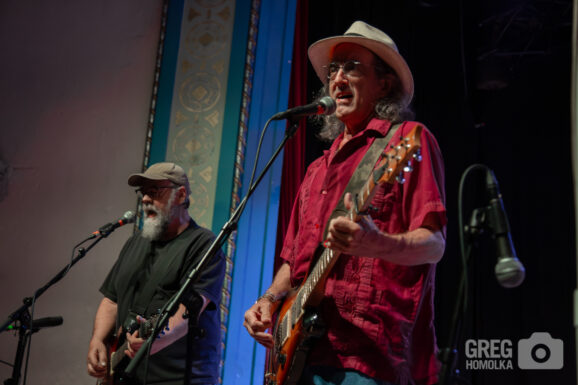Ascent to the Blues marks the nineteenth as a leader for trumpeter/composer Alex Sipiagin and the second for the mostly straight-ahead Posi-Tone label. It follows 2021’s Upstream. This writer and others have often compared the prevailing Posi-Tone to the classic Blue Note era, with an emphasis on hard bop and post-bop offerings. If any album in their esteemed catalog falls into that general area, it’s this one. The back story indicates that the Russian-born and for 30 years now New York-based Sipiagin was immersed in classical music as a teenager and came to jazz (and the blues) rather accidentally.
Listening to a friend’s mixtape, he became totally enraptured with Lee Morgan’s classic The Sidewinder without really knowing who the artist was or from which album it belonged to. This bluesy element of jazz, commonly referred to as soul-jazz or in some quarters a mixture of that and hard bop, became an obsession, eventually turning Sipiagin away from his classical training and in the direction of jazz. So, if this sounds like those early Blue Note recordings of yesteryear, every bit of it is intentional, yet there are just enough flourishes to keep it contemporary just the same. While Upstream had more than its fair share of ballads, this one has a few too but the clear emphasis is on swinging hard.
Sipiagin and producer Marc Free convene essentially the house rhythm section for the label with pianist Art Hirahara, bassist Boris Kozlov, and drummer Rudy Royston. In the vein of the classic trumpet-tenor sax quintets, Diego Rivera joins Sipiagin on the front line in an album of mostly originals, with a cover of another of his heroes, Woody Shaw, and, not surprisingly, two from Wayne Shorter, Morgan’s frequent front-line mate on many of those Blue Note recordings. There’s a traditional tune in the mix as well. In that sense, this is similar to Upstream’s repertoire which also featured compositions from both Shaw and Shorter.
Sipiagin has a beautiful full tone on both trumpet and flugelhorn and can soar with the best of players, especially backed by this stellar rhythm unit. His hard-hitting melodicism and fiery excursions, like those of his heroes, can be breathtaking. With blues underpinning every selection, the leader is making an important statement because far too often the form is overlooked, or even derogatively casted. The use of the word “Ascent” in the title says it all, it’s a form to aspire to. It may sound simple but it’s difficult to master with a highly communicative level of expression. Beginning with “Dolphin’s View,” it’s hard not to imagine that Herbie Hancock’s classic “Dolphin’s Dance” with trumpeter Freddie Hubbard and saxophonist George Coleman was at least subconsciously present.
“Blues for Wood” is the Woody Shaw piece and features strong ensemble lines and emotive, powerful bursts from both Sipiagan and Rivera. Shaw had an intensity few could match but Sipiagan manages to fly hard and high in the spirit of his hero. “Doppio” has Hirahara on Fender Rhodes in another original with tinges of fusion as all are swinging at full throttle to Royston’s insistent beats that push the leader into stratospheric realms once again, Rivera’s response dials it down just slightly before building back with a locomotive fury. The oft-covered Wayne Shorter’s “Infant Eyes” is a well-placed breather, displaying Sipiagin’s more lyrical side on flugelhorn.
“Hindsight” is a mid-tempo piece challenging rhythms that these elite players deftly navigate, taking it again into an uptempo swing mode with animated, soaring turns from Hirahara, Rivera, and the leader paced by Kozlov’s surging bass and Royston’s kinetic approach to his kit. “No Doubts” flows easily as the horns carry the melody to Hirahara’s Rhodes comping. Sipiagin’s white-hot solo at the upper reaches of his horn inspires aggressive statements from Rivera and Hirahara, whose immense skills on the Rhodes continue to impress. “Rush Hour” lives up to the frenetic character of its title with Sipiagin’s laser-sharp lines and intense blowing that ignite dazzling rapid runs from both Rivera and Hirahara as the rhythm tandem of Kozlov and Royston push the tempo.
“One More Shot” is a welcome, mid-tempo ballad with Hirahara yet again shifting to the electric side with extended, spiraling, explorative solos from both Sipiagin and Rivera before Kozlov finally gets a turn, with his own emphatic lyrical solo backed by sturdy support from his rhythm mates. The traditional folk form, “Novgood Bells” that follows is even a tad longer, another for Sipiagin’s lyrical flugelhorn. The opening sequence with flugelhorn, arco bass, tenor, and piano delivers a remarkably colorful set of harmonics. The contrast between the leader’s fiery solo and Rivera’s more deliberate approach here conjure the Morgan-Shorter conversations that inspire this project. Again, Hirahara’s piano solo is splendid and Sipiagin, as he does so often throughout, reaches some gorgeous high register notes that just soar.
Royston’s propulsive intro leads into “Sandrigo Blues,” another where all members burst out of the gate flying, with Royston unleashed mid-section, erupting with a flurry of syncopation that overflows like an overheated cauldron. They turn again to Wayne Shorter in the closing “Twelve More Bars to Go,” one of the most distinctly bluesy tunes in the full set with emotive turns from both front-liners and Hirahara riding the shimmering ivories as Royston and Kozlov man the bottom end.
While Sipiagin impressed with his melodic lyricism and precision in his previous outing, Upstream, he brings heat, authority, and joy here. His take on the blues is invigorating beyond compare. Make no mistake, this is a veteran at work, issuing perhaps his strongest recording – a must-hear where Sipiagin has leaped, or dare we say, ascended to a whole new level.












